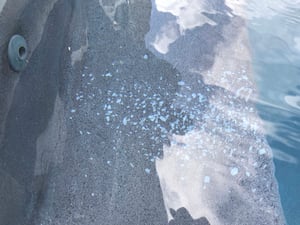Test your pool water and your fill water for calcium hardness.
Calcium flakes in pool water.
Dip the bucket into the pool until it is about 3 4ths full of water.
Soft water is low in calcium carbonate it is under saturated.
Calcium carbonate and calcium silicate.
Calcium carbonate is white and flaky and it s fairly easy to take off.
How to add calcium chloride to a pool step 1.
It s pretty easy to remove.
The white flakes may be calcium deposits that have accumulated over time.
Fortunately calcium hardness changes rather slowly so a once a month testing and adjustment should be all you need.
Hard water is water over saturated with calcium and magnesium.
Your pool should be at a ph between 7 4 and 7 6.
Swimming pool water high in minerals such as calcium will form scales on the pool walls in the piping and in the filters clogging these systems reducing the flow of water and decreasing the efficiency of the filter.
By nature calcium white flakes are common in saltwater swimming pools because of the high temperature and ph in electrolytic chlorine generators and the use of calcium in the production of chlorine that is introduced in the pool.
E z test pool supplies calcium often referred to as calcium hardness is one of those chemicals that could be easily ignored at first giving the appearance of little importance only to haunt the pool owner in the long run with serious costly damage.
The ideal reading for calcium hardness in pool water is about 200 to 400 parts per million.
Dip the test strip dip the calcium hardness test strip into the pool water.
Prolonged exposure to water high in calcium can cause a total system failure of a swimming pool.
Two types of calcium buildup there are two types of calcium scales that form in pools.
This excess calcium settles on the pool surfaces creating rough spots.
It looks like crystallized whitish scale and feels like a rough spot.
Both are caused by a ph imbalance.
Calcium scale deposits occur when your water has too much calcium.
There are two types of calcium compoundsthat form in pool water and create scaling calcium carbonate and calcium silicate.
If you see white flakes it is actually not paint but may be either calcium scale deposits or biofilm residue in your pool due to bad pool chemistry.
Calcium silicate in contrast is white grey and more difficult to move.

